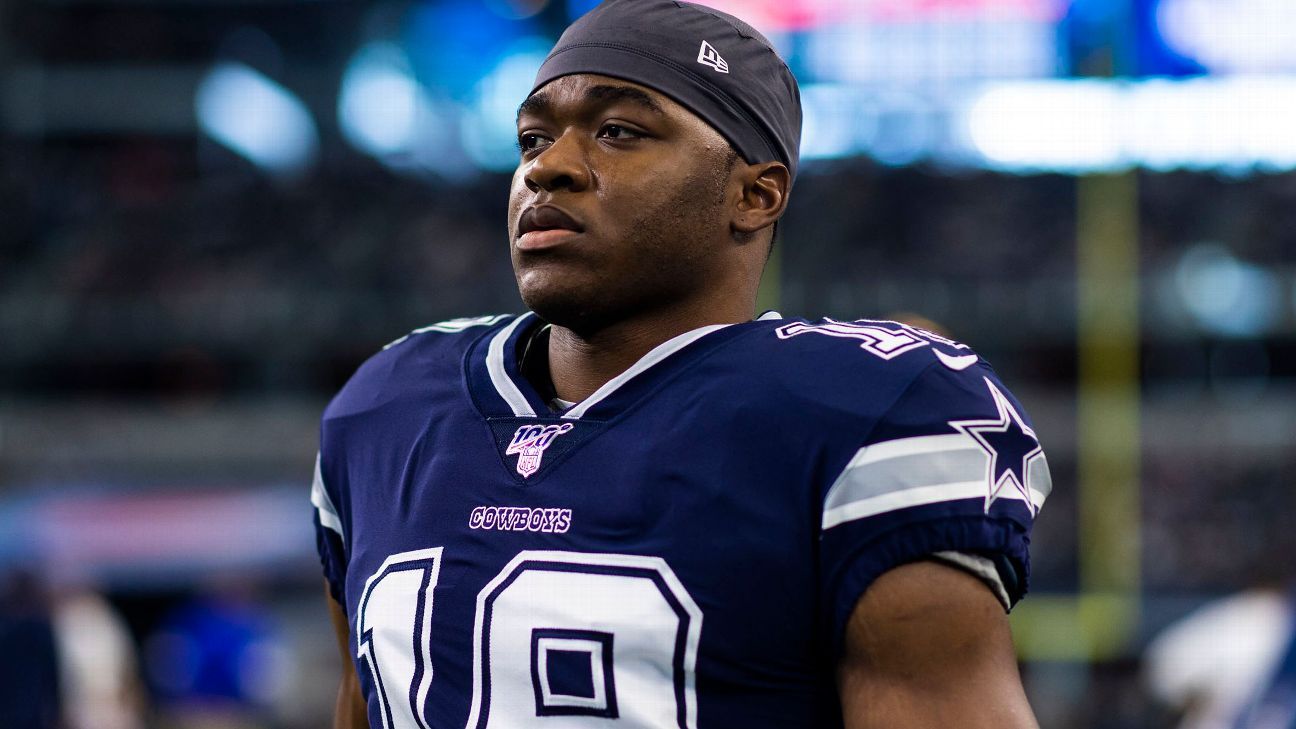One of the most enviable traits of Dallas Cowboys wide receiver Amari Cooper‘s game is his mastery of deception.
“You don’t want to let the person you’re playing against know what moves that you’re going to do next,” Cooper said. “You have to think three moves ahead.”
“It’s one of the biggest sayings in chess.”
Wait … chess?
Listening to Cooper talk about chess with such passion and detail, you unwittingly mistake it for his analytical breakdown of his route running on the football field. Like his elusive release off the line of scrimmage, or even when it looks like a defender has the jump on him, his shiftiness and change in pace get him wide open. Cooper sums it up much more elegantly.
“It starts with the imagination. If you have something in your head and you’re saying, ‘OK, this is what I’m going to do.’ You have to be creative.”
Heading into his seventh NFL season, his third in Dallas, Cooper starts 2020 fresh off his five-year contract extension with $60 million guaranteed. He’s ready to prove himself as an elite receiver, and, maybe less notably, as the Cowboys’ resident chess guru.
From his large, sunny kitchen outside of Dallas, Cooper, 26, lights up when talking about playing chess, and remembers exactly when the game first captivated him as an elementary school student in northwest Miami.
“My music teacher ran the chess club after school,” Cooper said. “But if we were done with our music lesson that day, he would teach us chess lessons.” The teacher encouraged Cooper to join the after-school chess club, but even from a young age, Cooper was already committed to another passion.
“I probably came after school one time [to chess club], because I was more interested in going to my after-school program, which is where we would play football.”
In the years that followed, graduating from Miami Northwestern Senior High School, three years as a standout receiver for the University of Alabama, declaring for the NFL draft following his junior season in 2015, Cooper hardly touched a pawn on the chessboard. But his initial interest in the game’s intricacies and deception never left his mind.
And in 2015, the desire to play chess was reignited.
Competition fuels Cooper
Drafted No. 4 overall by the Oakland Raiders in 2015, Cooper was familiarizing himself with his teammates when he noticed some of them spending a lot of time on their phones. Instead of thumbing through their Twitter or Instagram feeds, they were playing against each other in chess.
“That’s where my interest was really sparked,” Cooper recalls. “And Rod Streater was really good.”
Streater, a wide receiver, played the majority of his six-year career in Oakland before suffering from a neck injury in 2018.
He learned to play chess from his father and uncle when he was 5 years old. And after one casual conversation with Cooper, Streater instantly found someone whose love for the game — and of competition — could match his own.
“It started one day when I heard him talking about chess,” recalls Streater, from his office in Berea, Ohio, where he is now a scouting assistant for the Cleveland Browns. “I’m like, ‘There’s no way he plays.’ But we hopped on the mobile game Chess With Friends and it got competitive from there.”
As Cooper was setting rookie records — 72 receptions and 1,070 receiving yards — with the Raiders and heading toward his first Pro Bowl appearance, a different goal piqued his interest.
“I’m a real competitive person, so I’ll compete with you at just about anything, at just about any game,” Cooper said. “I wanted to get on Rod’s level.”
It didn’t take long. Cooper and Streater were playing chess so often that the rookie started beating his older, more experienced opponent.
“Don’t tell him this,” Streater laughs, “I stole some of his moves and used them against him. He’s a really good player. He taught me a lot.”
A lot of moves, Streater recalls, utilized the tactics of Cooper’s favorite chess piece, the knight.
2:22
With Michael Gallup coming off of a career year, Matthew Berry and Field Yates discuss if Amari Cooper’s average draft position is too high.
“It’s the most deceptive piece, in my opinion,” Cooper said. “I’ve won a lot of games with a knight, and I’ve lost a couple with that knight, because of the way it moves. You can’t see them coming in certain instances.”
For chess novices, Cooper explains. “The knight moves in an L shape, so it can move in any direction. And it can jump over other pieces.” It is the only piece in the game that can do so.
Deceptive, shifty, versatile. Sounds all too familiar to any NFL defensive back who has attempted to defend a Cooper double move, or to someone who has sat across from him over a chessboard.
“He just sits there with a blank face,” Streater says. “He’s deceptive. He’s quiet, but then out of nowhere, he’ll do something out of the ordinary, hits you with a sluggo [slant and go route]. He’s a quiet assassin. That’s how I’m going to describe him.
“Just like how he plays on the field.”
🗣 @AmariCooper9 on being a #DallasCowboy & being ready for the season.
— Dallas Cowboys (@dallascowboys) August 4, 2020
Other Cowboys catch on
Cooper has made an immediate impact in Dallas since being traded in the middle of the 2018 season. He ranks fifth in the league in receiving yards (1,914), and is tied for first in touchdown catches (14) over the past two seasons.
Inside the locker room, what started as a hobby for Cooper five years ago in Oakland is evolving into a way to bond with his teammates in Dallas.
While Cooper often plays chess on his phone, he also owns several chess sets, including a folding travel set that allows him to play on the road with his new rival: Cowboys cornerback Chidobe Awuzie.
“When he got here, he was my locker mate, and I had peeped that he was playing chess on his phone,” said Awuzie, who learned to play chess while playing football for the University of Colorado (2013-16).
Awuzie and former Cowboys cornerback Donovan Olumba, now with the Browns, had just established their own chess rivalry when they invited Cooper to join. But with one stipulation: They had to play over a real chessboard, not on an app.
Olumba purchased the board at a discount store, according to a story in The Dallas Morning News. The round pieces in the set give it the appearance of checkers, with the exception of the designations on top: Labels that identify each piece as a pawn, king, queen, rook, bishop, or knight.
“Donovan started playing [Cooper], and beat him the first time,” Awuzie said. “After that, he never beat him again, and he just sort of fell off.
“That’s when we really started playing together.”
While admittedly a less experienced chess player, Awuzie, like Cooper, relates his strategies in chess to his mentality on the field.
“As a defensive back, I’m more reactionary,” Awuzie said. “[Cooper] studies, does a bunch of stuff to get better at chess. I never did any of that. So, I see what he does and I try to find the best move to react to it.”
“Now,” he adds with a proud smirk, “I’m catching up to him.” As only a master of deception could, with a blank face, Cooper plays off his chess rival coolly.
“He’s a pretty good opponent. Sometimes he wins.”
Yet last season, Cooper posted to his Instagram story some simple text over a black background that read: “Don’t let Chido [Awuzie] fool ya’ll. He’s 21-5 overall against me in chess. Only time he wins is when I make it easy.”
Cooper’s the knight
Cooper’s insatiable drive is triggered when facing any of his opponents, whether juking and sprinting past them on the field or staring at them, emotionless, while leaning over a chessboard.
Cooper’s endgame is with himself as he strives to become a grandmaster of all pursuits.
“If you want to be successful at the things that matter in life, those things aren’t going to happen overnight. If you can train yourself to be great at those things, you’ll already be trained to go the distance. You can’t become great at chess overnight,” Cooper said.
As for the Cowboys’ season ahead, Cooper maintains the mentality he has adapted as a chess player continues to sharpen his skills as a receiver — especially that one familiar facet that applies directly to his meticulous route running. It’s one that chess rival Awuzie is well aware of.
“In real life, he’s the knight. That’s the most deceptive piece. His release, his game, he lulls you to sleep, his moves, his suddenness, all that stuff, it’s very comparable. The way he plays chess is very deceptive.”
Cooper agrees.
“You have to make the guy who’s guarding you think that you’re doing something different than what you’re actually doing. I’m always trying to make it to where he thinks he knows what I want to do, but he doesn’t. You have to be deceptive. And creative.”
This time, Cooper is talking about football.

